
 A Discovery of Witches by Deborah Harkness
A Discovery of Witches by Deborah Harkness
Dr. Diana Bishop, descendant of the famous Bridget Bishop of Salem, Massachusetts, turned her back on her natural powers after her parents were killed when she was a child. Instead, she relied on her brain power, went to Oxford and Yale, and became a well-known researcher in the field of history of science. Now she’s back at Oxford, spending the year studying old alchemical texts archived at the Bodleian Library. But when she calls the book known as Ashmole 782 from the stacks, she can feel its power and she can see hidden writing moving on its pages. It frightens her a bit and she notices that soon after returning it to the stacks, she’s attracted the attention of many creatures — vampires, daemons, and other witches — who are suddenly hanging around the Bodleian. One vampire in particular, Matthew Clairmont, an attractive professor of biochemistry and neuroscience, just won’t leave her alone. What is so special about Ashmole 782 and why are all these creatures hoping she’ll call it back?
After reading the blurbs about A Discovery of Witches, this was a book I was eagerly waiting for. I love academic settings (especially Oxford), old libraries, and the blend of history and science. And I did enjoy some of A Discovery of Witches for this reason. Diana Bishop is an urban fantasy heroine that I can relate to. She spends her time in libraries instead of tattoo parlors; she prepares lectures and writes letters of recommendation instead of training with weapons and kicking peoples’ butts. I understood her goals and interests and the way that her focus on academic pursuits makes her slightly awkward and absent-minded elsewhere. I was also much intrigued by Matthew Clairmont’s genetic research into the evolution of witches, vampires, and daemons and how this related to Diana’s research in alchemy.
Thus, A Discovery of Witches had a lot of potential for me, but there were three problems that ruined the book for me:
The first is that the book is simply way too long. With nearly 600 pages to work with, Deborah Harkness should have been able to get these interesting ideas farther off the ground. I was frustrated that, by the end, it had become clear that A Discovery of Witches is the first novel in a series. In this first installment, Harkness carefully develops the characters and sets up the romance. There is a lot of sitting in the library, hanging around various houses, talking, drinking tea, and eating. The story covers only about a month of time and I think I witnessed nearly everything Diana ate and drank during that month.
Secondly — and this is a common problem for me in urban fantasies — I couldn’t appreciate the romance which dominated the plot. Vampires are just not sexy to me and I had a hard time believing that an overprotective, angry, admittedly murderous vampire would be attractive to an independently-minded academic. Not to mention that his body is cold and his heart beats only rarely. He spends a lot of time growling, bossing her around, speaking roughly, giving everyone dark looks, and displaying mate-guarding behaviors — steering her around by her elbow and with his hand at the small of her back, hovering over her, blocking her path, pushing her up against barriers, “scooping” her up, tossing her on horses, grabbing her by the chin and twisting her neck, telling her she’ll catch cold if she sits on the ground (a guy who sequences DNA thinks that sitting on the ground will make her sick?). He even binds her with an oath without her permission. I find this kind of behavior in a courting male insufferable. This is a common problem for me, and one of the reasons I don’t read much vampire lit, but I wasn’t expecting to encounter this issue in such magnitude in a book about a famous researcher from Oxford and Yale. I know she’s scared of what’s going on in her life, but where is this woman’s self-respect? In some ways, A Discovery of Witches felt like Twilight for middle-aged academics. The most unbelievable part of the entire romance, though is that [Spoiler — highlight text if you want to read it:] they get married (he binds her with a kiss and then tells her it means they’re married — this coercion doesn’t seem to upset her), and then they spend the rest of the book sleeping naked in the same bed but not consummating the marriage because he wants to wait until the time is right. She easily submits to this, too. [End spoiler.]
Thirdly, there are a lot of minor plot issues that just don’t fit into a well-developed fantasy, especially once we leave the academic atmosphere of Oxford and the book starts to feel like Harry Potter. Magic in this world seems arbitrary. We’re told that each power has a genetic marker, which is cool, but its practice is not sufficiently explained. It’s the snap-your-fingers-to-clean-the-dishes, close-your-eyes-and-concentrate-to-fly type. Sparks fly from Diana’s fingers, she cries rivers of tears, witchfire bursts from her outstretched arm. She is suddenly accumulating a host of new skills that make her the most powerful witch alive, but she doesn’t respond with the awe we’d expect. When she finds out that she can time-travel, she practically shrugs it off (and the physics of time-travel don’t even try to make sense).
I truly enjoyed the first part of A Discovery of Witches — the relatable heroine, the university setting, the focus on the history of science. But once the romance got going and we left Oxford, A Discovery of Witches lost its charm. I’m still curious about the blend of genetics, evolution, and alchemy, but the long sick romance dominated this intriguing mystery and the plot could not hold up against it. I may take a look at the sequel, though, just because I really want to know what’s inside Ashmole 782.
~Kat Hooper
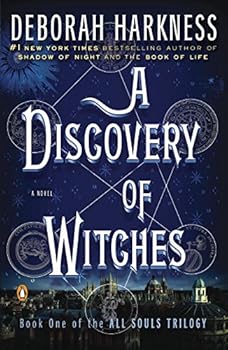
![]() Like every other fantasy novel since 1997, A Discovery of Witches has been compared to the HARRY POTTER series. I often argue that debut novels should be judged by their own merit, that the Harry Potter yardstick is too reductive. In this case, however, Harry Potter comes off worse by association. A Discovery of Witches promises a world of witches, vampires and daemons, of a hidden manuscript which holds the key to the future, of a dark, forbidden love at the centre of the tale. It all looks very good on paper, doesn’t it? Unfortunately, the novel doesn’t quite live up to what it says on the tin.
Like every other fantasy novel since 1997, A Discovery of Witches has been compared to the HARRY POTTER series. I often argue that debut novels should be judged by their own merit, that the Harry Potter yardstick is too reductive. In this case, however, Harry Potter comes off worse by association. A Discovery of Witches promises a world of witches, vampires and daemons, of a hidden manuscript which holds the key to the future, of a dark, forbidden love at the centre of the tale. It all looks very good on paper, doesn’t it? Unfortunately, the novel doesn’t quite live up to what it says on the tin.
Diana Bishop is a witch. Not in the wandbrandishing, spellreciting way we’re used to, though. She has relinquished all magic in favour of a quiet academic career studying the history of science. One day, she accidentally recalls a lost manuscript from the Bodleian library in Oxford titled Ashmole 782. There are three pages missing from the manuscript and strange shimmering writing that she cannot discern on the pages. There is obviously something magical about the manuscript as it gives Diana a “tingling feeling of unmet desire,” whatever that means.
Anyway, Diana is not alone in said library. As well as fellow witches, there are also daemons at the reading tables. As she stretches to reach for a book on a high shelf, she uses magic to nudge it into her outstretched hand. She suddenly realises someone has watched her doing so. She turns to find a dark, impossibly tall and impossibly handsome man watching her, and realises he is a vampire. Tonguetied and wobblylimbed, she ‘accidentally’ falls into his arms. This marks a subsequent nosedive in the plot (which is a shame, seeing as we are only on page 18 out of 688).
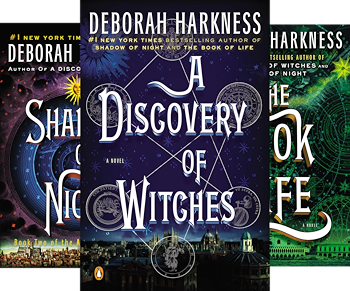 The vampire is Matthew Clairmont, an elusive vampire of ancient lineage, and a professor of science at Oxford. He becomes extremely interested in Diana, seemingly because of the manuscript Ashmole 782, which, it turns out, a bunch of other witches are after too. And it doesn’t take a genius to see where this plot is going: Matthew’s interest in Diana quickly deepens, and both find themselves irrevocably drawn to one another. In a love affair reminiscent of Twilight, they embark on a forbidden relationship between vampire and witch.
The vampire is Matthew Clairmont, an elusive vampire of ancient lineage, and a professor of science at Oxford. He becomes extremely interested in Diana, seemingly because of the manuscript Ashmole 782, which, it turns out, a bunch of other witches are after too. And it doesn’t take a genius to see where this plot is going: Matthew’s interest in Diana quickly deepens, and both find themselves irrevocably drawn to one another. In a love affair reminiscent of Twilight, they embark on a forbidden relationship between vampire and witch.
Somewhere during my reading of this novel, I lost count of the times I wanted to throw it out of a window. There were just so many frustrating issues with the characters and plot and writing, I found myself cursing my resolve to always see a book to its end. My first issue was how badly it was written. There were so many awful, clumsy similes.
The witches eyelids were twitching as if she were watching a movie only she could see.
Sets the tone, soon to be followed by:
…staring into the chrome on the espresso machine as if it were a magic mirror.
Then there’s this double whammy:
Matthew was lounging against the kitchen doorframe with the nonchalant air of a Renaissance aristocrat waiting to have his portrait painted…watching me with the stillness of an eagle ready to pounce on his prey.
Then there’s Matthew’s infuriating dominance over Diana. I couldn’t count the times he “sheltered her with his arms, like an eagle guarding its prey.” I think readers can rest assured that Diana is fine — stop sheltering the damn woman. Every step he assists her, every stumble he is furious with her, which Diana attributes to his being ‘oldfashioned.’ Even when he locks her in his car until he can open her door himself. There’s a word for that in this modern day and age, and it ain’t ‘oldfashioned.’
And then there is the complete implausibility of their falling in love. These two become married before they have even kissed. There is suddenly a smouldering sexual tension between the pair who have done little more than bump into each other a few times in the library. The complete lack of conviction and believability about these stereotypical characters was infuriating.
The plot meandered and stalled for almost 700 pages. The book should perhaps have been published as two novels — at least then the startover in Madison that seems to occur somewhere in the middle would have made more sense. Furthermore, Harkness seems to dwell far too long on the things she loves, that aren’t particularly interesting to read about in the slightest: the topics of yoga, wine and tea are all thoroughly exhausted, and I later discovered that Harkness actually blogs about wine, so go figure.
~Rachael McKenzie
All Souls — (2011-2014) Publisher: A richly inventive novel about a centuries-old vampire, a spellbound witch, and the mysterious manuscript that draws them together. Deep in the stacks of Oxford’s Bodleian Library, young scholar Diana Bishop unwittingly calls up a bewitched alchemical manuscript in the course of her research. Descended from an old and distinguished line of witches, Diana wants nothing to do with sorcery; so after a furtive glance and a few notes, she banishes the book to the stacks. But her discovery sets a fantastical underworld stirring, and a horde of daemons, witches, and vampires soon descends upon the library. Diana has stumbled upon a coveted treasure lost for centuries — and she is the only creature who can break its spell. Debut novelist Deborah Harkness has crafted a mesmerizing and addictive read, equal parts history and magic, romance and suspense. Diana is a bold heroine who meets her equal in vampire geneticist Matthew Clairmont, and gradually warms up to him as their alliancedeepens into an intimacy that violates age-old taboos. This smart, sophisticatedstory harks back to the novels of Anne Rice, but it is as contemporary and sensual as the Twilight series — with an extra serving of historical realism.

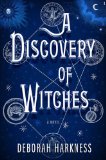
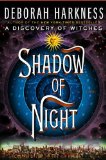
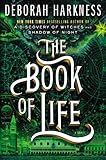



I was writing a Nanowrimo story at one point featuring a heroine who was an academic secretary and stumbled across a fateful clue while making copies for her department head. :D
That sounds like a fun story!
Yeah, well, it did get worse from there. LOL.
“Somewhere during my reading of this novel, I lost count of the times I wanted to throw it out of a window”. Loved this!
I tossed it about 1/3 of the way into the book.
I tried reading this a couple weeks ago. (The series looks so handsome sitting together on a library shelf.) I couldn’t make it past the first chapter: clumsy prose, overwrought metaphors with bits of exposition crammed in wherever they seemed like they might fit like a teddy-bear with its stuffing leaking out all over. The first chapter, I thought was somewhat evocative of Elizabeth Kostava’s much better novel, The Historian, which I wished I was reading instead. Great review!
Well this seals the deal for me. Someone I know who is a friend of the author tried to get me to read it, but there have been just too many bad reviews from people I respect. Seeing actual quotations puts the cap on it for me.Thanks, Rachael!
I picked this up when I saw the last in its trilogy won the 2014 Goodreads Choice Awards in the fantasy category. I laboured on not much further than the “nosedive” you mentioned. I really hope the closing book has truly made a marked improvement compared to this one! Though even that in no way could motivate me to wade through this book. I salute your perseverance for finishing it.